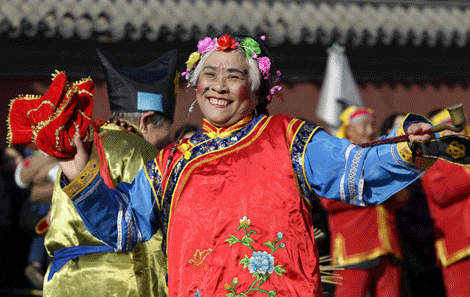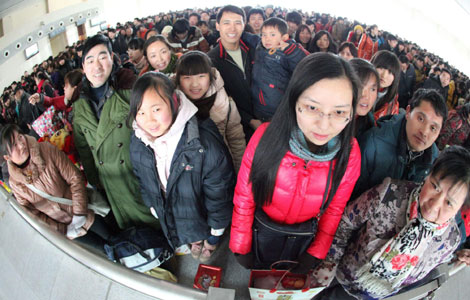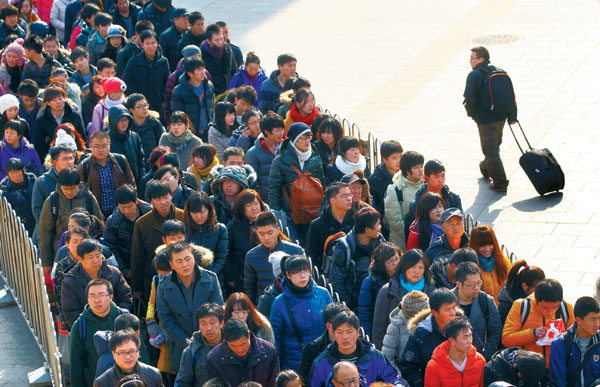Cities see surge of returning workers
Updated: 2012-01-30 07:15
By Xu Wei and Li Wenfang (China Daily)
|
|||||||||
BEIJING / GUANGZHOU - The week-long Spring Festival holiday ended with another travel peak as millions of travelers returned from family visits to work, raising pressure on railroads and highways.
Railway authorities said on Sunday that more than 6.6 million individual train trips were recorded across the nation on Saturday, the last day of the holiday. The authority put 815 more trains into service to meet the increase in travel demand.
The Spring Festival, regarded by Chinese as a traditional occasion for family reunions, fell on Jan 23 this year. The holiday lasted from Jan 22, the eve of the Lunar New Year, to Jan 28.
To ease the growing pressure at railway terminals, the Beijing Railway Station activated two temporary terminals on Saturday to ensure passengers' quick exit from the station.
Yu Xuejin, an official from the publicity office of the station, estimated that this second travel peak, mainly composed of office workers returning from family visits, would only last for one or two days.
The travel peak for other types of passengers would come later.
"The travel peak of migrant workers will mostly arrive after the Lantern Festival", which falls on Feb 6 this year, Yu said. "College students will mostly arrive after February 10 when the new semester begins."
In Shanghai's Hongqiao Railway Station, fast-food restaurants were filled with passengers, most of whom carried presents for friends and colleagues.
The Shanghai-based Xinmin Evening News reported that 138,500 passengers departed from the Shanghai Railway Station on Saturday, while the returning peak of passengers would come in a week, when migrant workers and students returned.
The Guangzhou Railway Station, one of the railway hubs of the Spring Festival travel rush, was largely orderly on Sunday.
Xia Jianze arrived at the Guangzhou Railway Station on Sunday afternoon after sitting on a stool she brought for the 28-hour trip from Ankang, Shaanxi province. "The train was very crowded but it was possible to reach the toilet and get hot drinking water," Xia said.
Her husband waited in line for three hours but could only get standing tickets, 10 days before the trip. "It is hard to get tickets to Guangdong," Xia said.
Guangdong province has the nation's largest migrant worker population.
The civil aviation authority said on its website on Sunday that 970,000 individual trips were made by air on Saturday, up from the total of 900,000 on Friday.
Long lines of cars also formed at tollgates on highways headed to Beijing on Saturday afternoon. The Beijing Morning Post reported that some tollgates were forced to stop charging at times to ease congestion.
Mu Huailong, a driver from Luanping county of Hebei province, said lines of cars stretching as far as 1 km formed before tollgates of the Beijing-Chengde Highway at 1 pm on Saturday.
"I was shocked to see the long lines," Mu recalls. "And then I realized that it was the end of the Spring Festival holiday."
Congestion also occurred at the Beijing-Hong Kong-Macao Highway's Hunan section as cars waited in long lines outside service zones for fuel, local traffic police said on Sina micro blog.
Northwest China and regions south of the Huaihe River will see light rain and snow from Sunday to Monday, while sleet or moderate snow will hit the middle and lower reaches of the Yangtze River, said the China Meteorological Administration on Sunday.
A weak cold front will hit the central and eastern regions over the next 24 hours, decreasing temperatures by four to six degrees, the authority said.
Xie Yu in Shanghai contributed to this story.
Hot Topics
Kim Jong-il, Mengniu, train crash probe, Vaclav Havel, New Year, coast guard death, Internet security, Mekong River, Strait of Hormuz, economic work conference
Editor's Picks

|

|

|

|

|

|








